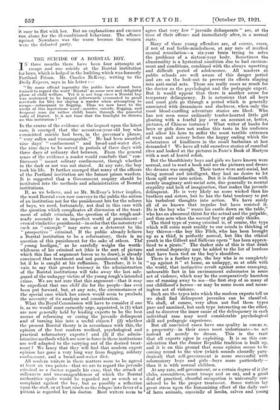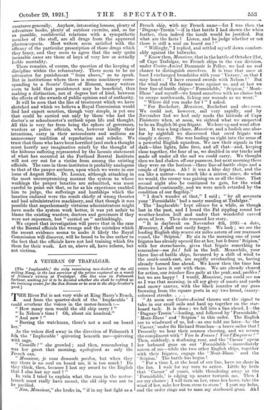THE SUICIDE OF A BORSTAL BOY.
IN three months there have been four attempts at escape and one suicide at the Borstal institution for boys, which is lodged in the building which was formerly Portland Prison. Mr. Charles McEvoy, writing to the Daily Express, says in his letter :—
By some official ingenuity the public have almost been trained to regard the word Borstal ' as some new and delightful phase of child welfare. Yet it is not long since a Borstal boy was sentenced to be hanged (afterwards commuted to penal servitude for life) for slaying a warder when attempting to escape—subsequent to flogging. Thus we now have to the credit of this mysterious word—murder, suicide, flogging, and frequent man (or rather child) hunts through the peaceful vales of Dorset. Is it not time that the limelight be thrown on this institution "
In the course of the evidence at the inquest upon the latest case, it emerged that the seventeen-year-old boy who committed suicide had been, in the governor's phrase, very sullen and unmanageable." He had been awarded nine days' " confinement " and bread-and-water diet, the nine days to be served in periods of three days with three days of ordinary diet between. From the general sense of the evidence a reader would conclude that " con- finement " meant solitary confinement, though whether in the dark or not was not stated. At any rate, the boy took his life. It further emerged that many of the officers of the Portland institution are the former prison warders. It is suggested that a Government enquiry should be instituted into the methods and administration of Borstal institutions.
If, as we believe, and as Mr. McEvoy's letter implies, the word Borstal even now conveys to the public the notion of an institution not for the punishment but for the reform of boys, we need, fortunately, not deal in this case with the question which complicates all discussion of the treat- ment of adult criminals, the question of the rough-and- ready necessity in an imperfect world of punishment— even of vindictive punishment—in order that the notoriety of such an " example " may serve as a deterrent to the " prospective " criminal. If the public already believe a Borstal institution to be a reformatory, there is no question of this punishment for the sake of others. Thi " young hooligan," as he carefully weighs the worth- whileness of his criminal act (this is the sort of picture which this line of argument forces us to draw), is already convinced that treatment and not punishment will be his lot if he is caught at his ruffianism. Therefore, it is in vain to say that greater leniency in the administration of the Borstal institutions will take away the last safe- guard of the unhappy victim of the young rough's intended crime. We arc not sure that this argument—that it may be expedient that one child die for the people—has ever been put forward, but, at any rate, the circumstances of the special case which has arisen would seem to preclude the necessity of its analysis and consideration.
What the Royal Commission will have to consider if one is, as we would most earnestly urge, appointed, is (1) what are now generally held by leading experts to be the best means of reforming or curing the juvenile delinquent and of turning him into a useful citizen ? (2) whether the present Borstal theory is in accordance with this, the opinion of the best modern medical, psychological and practical reformatory experts ? and (3) if the admin- istrative methods which are now in force in these institutions are well adapted to the carrying out of the desired treat- ment ? We fancy that they will find that modern expert opinion has gone a very long way from flogging, solitary confinement, and a bread-and-water diet.
All modern writers in these matters seem to be agreed at least on two points—that we are to regard the juvenile criminal as a doctor regards his case, that the attack of sullenness and unmanageableness of which the Borstal authorities spoke would be regarded not so much as a complaint against the boy, but as possibly a reflection upon the staff, or at least much as the relapse into fever of a patient is regarded by his doctor. Most writers seem to agree that very few " juvenile delinquents " are, at the time of their offence and immediately after, in a normal state.
Many of these young offenders are, of course, cases, if not of real feeble-mindedness, at any rate of marked mental retardation—a six-year brain trying to solve the problems of a sixteen-year body. Sometimes the abnormality is a hysterical condition due to bad environ- ment and conditions, combined with the always upsetting and difficult period of adolescence. All masters at public schools are well aware of this danger period and are on the look-out to prevent its effects shaping into anti-social acts. These are really cases as much for the doctor as the psychologist and the pedagogic expert. But it would appear that there is another cause for temporary delinquency. It is notorious that all boys and most girls go through a period which is generally associated with dreaminess and slackness, when only the most blood-curdling adventure stories are liked. Who has not seen some ordinarily tender-hearted little girl gloating with a fearful joy over an account or, better, pictures, of Chinese tortures ? 'What writer of books for boys or girls does not realize this taste in his audience and allow his hero to suffer the most terrible extremes of want and misery before the happy ending which the substratum of kindliness in the small barbarian at last demanded ? We have all told ourselves stories of cannibal rites and looked at the pictures in Foxe's Book of Martyrs with a sort of horrid relish.
But the bloodthirsty boys and girls we have known were normal, and to read a book and see the pictures and dream the dreams was enough. Their tastes were anti-social, but being normal and intelligent, they had no desire to let them spill over into action. But it is dissatisfaction with merely imaginary anti-social acts, due generally to mental stupidity and lack of imagination, that makes the juvenile delinquent. He is very likely no more wicked than his brothers and sisters, but he has the fatal tendency to put his turbulent thoughts into action. We have surely all of us known that impulse but have resisted it. He is the boy who " wants his castle down on the table," who has an abnormal thirst for the actual and the palpable, and thus acts when the normal boy or girl only thinks.
• The third type of young criminal is, of course, the type which will come most readily to our minds in thinking of boy thieves—the boy like Filch, who has been brought up as a thief, is perfectly normal, but like the ethical youth in the Gilbert and Sulli van opera " has been appren- ticed to a pirate." The darker side of this is that drink and sexual depravity may be added to the list of burdens that have been tied on the boy's shoulders.
There is a further type, the boy who is so completely " up against it " at home, so unhappy, so at odds with the world, that instinctive revolt against some cramping, unbearable fact in his environment culminates in some act of violence, which may be the comparatively harmless one of running away to sea—the first step of so many of our childhood's heroes—or may be some mean and mean- ingless act of violence. Such arc the types into which the modern experts tell us wo shall find delinquent juveniles can be classified. We shall, of course, very often not find these types pure and unmixed, but each type interacting on the other, and to discover the inner cause of the delinquency in each individual case may need considerable psychological skill and pedagogic experience. But all convicted cases have one quality in common, a propensity—in their cases most unfortunate—to act instead of merely to dream. This is the trait that all experts agree in exploiting. It is on this con- sideration that the Junior Republic tradition is built up, and it is on this ground that some opinion seems to be coming round to the view (which sounds absurdly para- doxical) that self-government is more successful with reformatory boys and girls—boys more particularly— than it is with normal children.
At any rate, sell-government, or a certain degree of it (bv clubs, committees, scout troops and so on), and a great deal of practical, cheerful occupation is universally con- sidered to be the proper treatment. Some writers lay great stress upon the humanizing effect of the daily care of farm animals, especially of lambs, calves and young creatures generally. Anyhow, interesting lessons, plenty of adventure books, plenty of outdoor exercise, and, so far as possible, confidential relations with a sympathetic member of the staff, are all drugs from the approved pharmacopoeia. Most writers seem satisfied with the efficacy of the particular prescription of those drugs which they fancy, and they seem to agree that the only quite incurable cases are those of boys of very low or actually feeble mentality. There remains, of course, the question of the keeping of discipline within the reformatory. There seem to be no advocates for punishment " from above," so to speak. But in institutions where there is some machinery corre- sponding to a Scouts' Court of Honour, many writers seem to hold that punishment may be beneficial, thus making a distinction, not of degree but of kind, between the effects of the awards of public opinion and of authority. It will be seen that the line of treatment which we have sketched and which we believe a Royal Commission would find had expert sanction, though very simple, is yet one that could be carried out only by those who had the doctor's or schoolmaster's outlook upon life and thought. All this is very far from being the sphere of governors, warders or police officials, who, however kindly their intentions, carry in their antecedents and uniform an unnecessary tradition of reprobation and rebuke. We trust that those who have been horrified (and such a thought must horrify any imaginative mind) by the thought of the hideous suffering represented by the laconic statement of what has occurred at the Portland Borstal Institute will not cry out for a victim from among the existing officials. The case in these institutes is probably analogous to that of the pauper asylums, upon which we wrote in our issue of August 20th. Dr. Lomax, although attacking in the most uncompromising manner the system to whose workings the pauper lunatics are submitted, was most careful to point out that, so far as his experience enabled him to judge, the sufferings and hardships which the lunatics endured were the result chiefly of wrong theories and bad administrative machinery, and that though it was possible that superhumanly virtuous administrators might have made the system work better, it was yet unfair to blame the existing warders, doctors and governors if they were not supermen, but " carried on " unthinkingly. We expect that investigation will prove that in the case of the Borstal officials the wrongs and the mistakes which the recent evidence seems to make it likely the Royal Commission will discover, will be found to be due rather to the fact that the officials have not had training which fits them for their work. Let us, above all, have reform, but not victims.







































 Previous page
Previous page